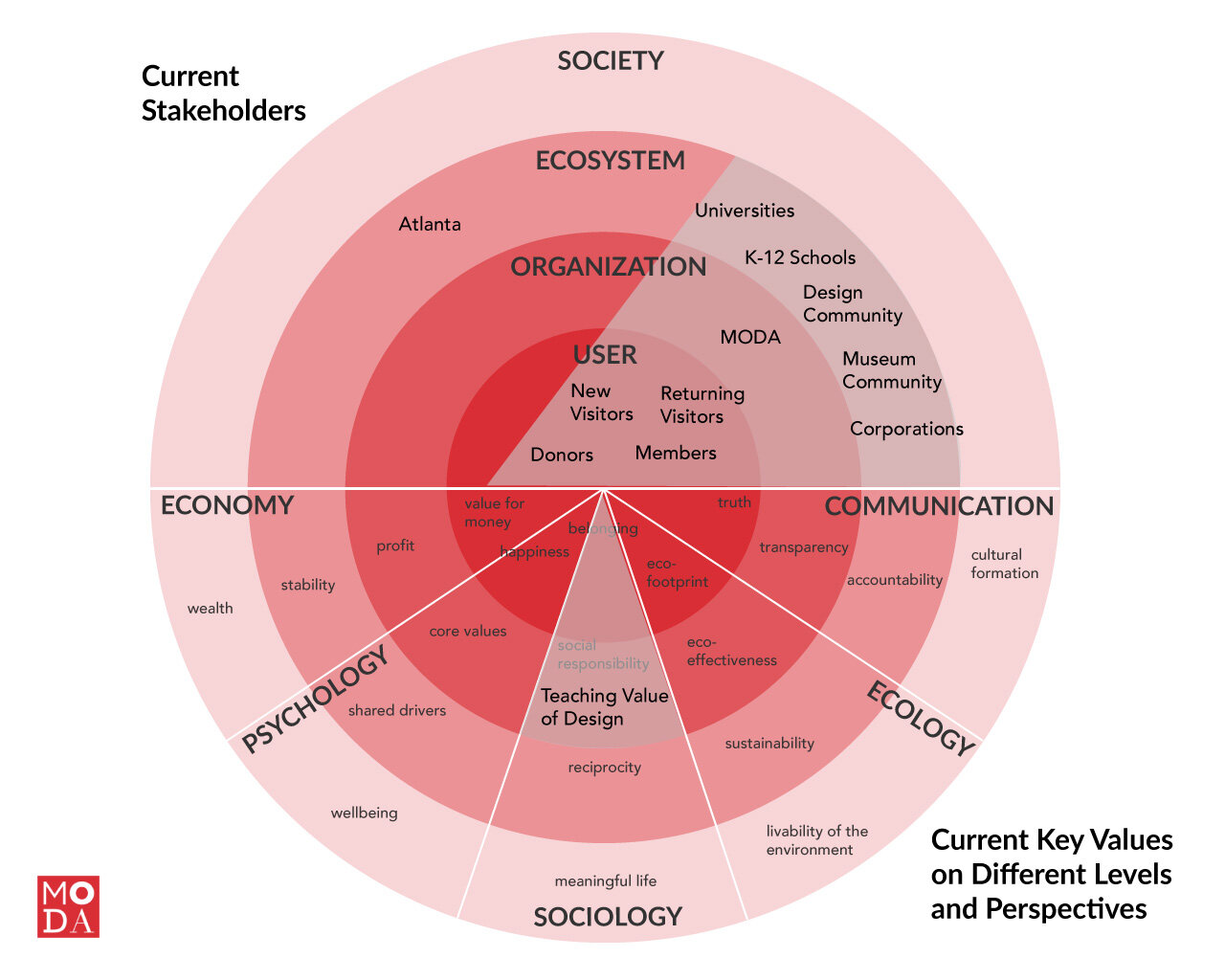
Systemic Innovation for Service Evolution: MODA

Project Introduction
Working on a real life case study of the Museum of Design Atlanta, our focus was to create systemic innovation for service evolution within an established organization. Along with our systemic service innovation, we were tasked with creating a business proposal and implementation timeline, marketing strategy, and innovation metrics.
Roles: Strategist, Researcher, Writer, Concept Development, Logo Design
2019
Methodology
Secondary Research
Upon acquisition of financial and strategic documents from MODA, a thorough review and follow-up conversations with the client. We attempted to understand the socio-historical contextual nature surrounding the museum and read between the lines on quantitative data. Our approach was to study the three institutions MODA is nested within - the South, design and museums.
Primary Research
Surveys and interviews were conducted around the topics of design and museums. Client meetings with Laura Flusche, Executive Director to align on project objectives and issues to be addressed. Observational visits to understand MODA’s layout, service flow and interactions between visitors and the service.

How might MODA break free of the institutionalized limitations of what a museum should be and innovate into what it could be?
Opportunity Space
We found that MODA was not effective on the micro, meso and macro levels in serving the South, educating the public on design, and in delivering on the experience of a museum.

Value Framework (Current, Pre-Intervention)

Value Framework (Future, Post-Intervention)
The Designer-in-Residence program strives to create impact all the way up to the society level in order to drive transformational change. It seeks to break institutional arrangements at the society level while also rooting itself deeply within Atlanta at the ecosystem level and new visitors at the user level. This new service innovation will also impact through the value lenses of economic, psychological, sociological, ecological and communications at multiple levels. From the value lens of sociological, MODA will create true transformation through validation, diverse representation and creating new narratives in design.

MODA Designers-in-Residence program logo design
Design Outcome: Designers-in-Residence Program
This 9 month cyclical program takes a co-creative, community-based approach to the design process. By featuring the work of local and independent designers, this will elevate the work and voices of those typically excluded from exhibiting in museums (such as people of color, women, immigrants and queer designers).
The 9 month cycle starts with a 3 month long Pre-Residency period, for preparation of work and planning of workshops. This is followed by 3 months of Residency (Co-Creation), in which co-creation workshops are held with the public to help create the works to be exhibited. The last 3 months of the Residency is the exhibition showing. Designers-in-residence will cycle through, with at least four designers in-process at a time. Licenses for the work created during the residency will be jointly owned by MODA and the designer, with opportunities for production and sales.
This program also contains an outreach strategy to reach communities that have previously felt excluded from a design or museum setting. This includes free admission days for residents, and scholarships and free transportation to increase accessibility for underserved communities.

Social Business Model Canvas
Our goal is to create safe spaces, engage with and increase design literacy of the Atlanta community, develop new designers, and feature inclusive design work. This design for inclusion strategy reflects, represents and engages with the intersectional experiences of people across race, sexuality, class, gender and ability.
Project Learnings
Key takeaways include the importance of analyzing institutional logics and intersecting relationships between multiple institutions in order to determine how to best disrupt them. Social innovations must be sold to an organization using a strong business case and trackable metrics. Think through the impact of your innovation or intervention on each unique type of stakeholder. Value is more than just financial or exchangeable - it can intangible, co-creative and emotional. Create a multi-phase implementation strategy to aid with successful future implementation.